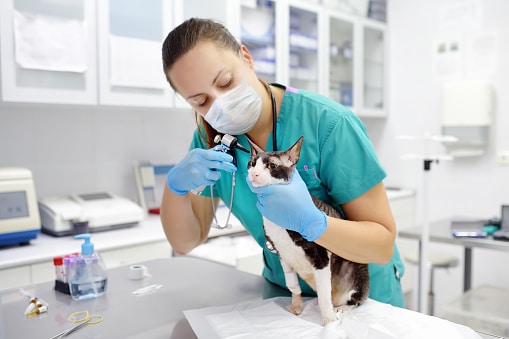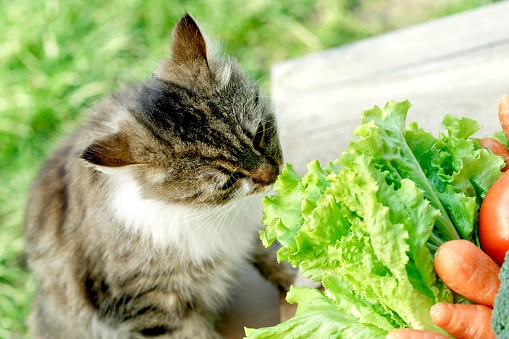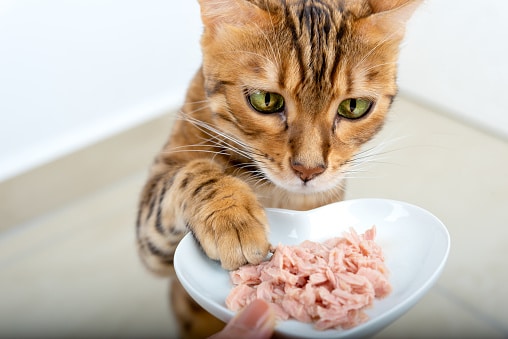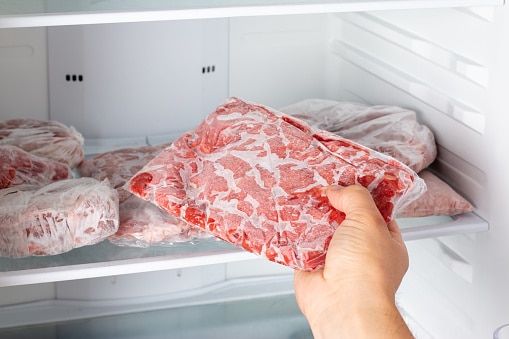Suppose you leave your cat unattended for a short duration, only to discover that he/she has ingested raw chicken (or any raw meat for that matter) in your absence. What should you do? Is this a cause for worry?
We’ll talk in detail about what you should do if your cat eats raw chicken.
Does Raw Meat Affect Cats?
Well, it depends on the chicken.
Allow me to explain. If, for example, the meat you purchased is fresh and intended specifically for the cat, he/she should still be healthy and unaffected. After all, cats are classified as carnivores, even if they are domesticated.
Still, it won’t hurt to keep an eye on your pet if you think he has eaten something that might not agree with him, and be prepared to ask your vet for advice on how to proceed if your cat begins to show signs of discomfort or pain. There are several ways cats show distress caused by gastrointestinal upset. More on that later.
Now imagine that it all goes pear-shaped. Your lovable feline companion is experiencing vomiting and diarrhoea after eating some raw meat that definitely wasn’t meant for him. In the event of such an unfortunate occurrence, what should you do?
To understand the situation better, we must probe deeper into the matter: the question here, like in so many other cases, is not of what, but rather, of why. So, why does the ingestion of raw meat, in some cases, prove to be a cause of such gastrointestinal distress to cats? And, more pressingly, what can we do to ensure that a repeat performance doesn’t occur?
Why Does Eating Raw Meat Affect Cats?
Food Poisoning And Infection

The answer to that, unsurprisingly, is bacteria. Raw meat can double up as a veritable playground for harmful bacteria, the most dangerous and widespread among these being, of course, salmonella. To put things into perspective, salmonella poisoning, if left untreated, can kill humans. Granted, it’s rare, but that doesn’t make it untrue.
If you are worried that your cat may be suffering from salmonella poisoning, watch out for these signs:
- Diarrhoea
- Vomiting or blood in stool
- Trouble breathing
- A swollen abdomen
- A general loss of appetite
The chances are that your cat will be trying to communicate his discomfort to you, so pay close attention to any unusual behaviour that he displays.
Even in the absence of harmful bacteria, if your cat is not used to raw meat, he might experience a degree of gastrointestinal upset. This may manifest itself in the form of vomiting or diarrhoea, which is not a cause for much alarm. You can do precious little things for your cat if this does occur, apart from keeping him warm and comfortable. If, however, the symptoms persist, you should waste no time in contacting your vet. This may signal some deeper underlying problem, and the sooner you seek professional medical help, the better.
Bone Splinters
An unforeseen foe you should watch out for is bone splinters. While vets may exalt the calcium content present in bones and the health benefits of feeding the same to your pet, you would do well to remember how brittle bone actually is and how its propensity for breaking and splintering may damage the lining of your cat’s stomach (not to mention the entirety of the alimentary canal).
An internal injury such as this could prove to be a challenge to treat, in addition to being extremely painful for the pet concerned. Why take the risk? My advice is to stick to animal-friendly calcium supplements if you must and to feed your pet chicken bones only when you are around to observe them during feeding time. A misstep could be the cause for a lot of pain for your pet that could’ve easily been avoided in the first place.
What Should You Feed Your Cat?
Since cats are carnivores, they need to have a source of animal protein to remain optimally healthy. An obvious choice for most cat-owners is to feed their pet a mixture of kibble and home-cooked food, plus a portion of meat every day.
Vegan Diet?

Keep in mind that cats cannot thrive on vegetarian or vegan diets, and these should not be implemented whatsoever. If one is still unsure about the appropriate diet for their specific cat, they can always contact a vet and let them create a particular diet just for your cat.
Seafood?
 You should also remember that a cat’s love for fish is not always healthy. Fish contains high levels of fatty acids, which can prove to develop medical concerns if consumed daily. So do your cat a favour and ration their supply of fish appropriately.
You should also remember that a cat’s love for fish is not always healthy. Fish contains high levels of fatty acids, which can prove to develop medical concerns if consumed daily. So do your cat a favour and ration their supply of fish appropriately.
What About Meat?

Raw meat is acceptable as long as it is intended for the cat and suitably preserved for freshness. Lean muscle meat is a good choice as far as raw meat goes: it is rich in protein and amino acids and can assist in fulfilling your cat’s nourishment needs. Lean muscle meat is definitely one of the more nutritious options for a cat.
Raw chicken liver is also a great option as it contains excellent vitamins and is rich in other nutrients. It would be best if you took care to ration the portions, though, since too much of a good thing is terrible, which stands true in this case. These carefully selected portions of meat also have the added bonus of being completely bone-free, which will prove to be a more relaxed and enjoyable meal for your cat.
While we are on the subject, what shouldn’t you feed your cat?
Hopefully, this article has provided you with a general knowledge of what foods are acceptable for a pet cat. Now, let us talk about food items that are a strict no-no when it comes to cats.
Given below is a handy list:
- Raisins/ sultanas.
- Grapes
- Chocolate
- Coffee and caffeinated products: Caffeine is a nervous stimulant and should not, under any circumstances, be fed to pets.
- Bread dough
- Avocado
- Nuts
- Corncobs
- Fruit stones
- Fruit pits
- Tomatoes
- Mushrooms
- Milk: This one may seem counter-intuitive since kittens love milk. However, as they grow older, cats gradually lose the ability to synthesise milk protein, leading to stomach upset.
Vets also advocate against a strictly dry kibble diet. Dry kibble can increase your cat’s chances of being dehydrated, which can lead to a whole slew of problems, one of which is issues with the urinary tract and a general loss of energy. Instead, if you must choose cat food, opt for the canned or wet variety.
We’ve Circled Back to Our Original question: What Should you do if your Cat Eats Raw Chicken?
The answer is simple: do nothing, just observe. If your cat displays abnormal behaviour that appears to stem from gastrointestinal discomfort, contact a vet and ask for advice. More importantly, remember that this event in and of itself is not a cause for panic.
Cats, as carnivores, have much shorter intestinal tracts as compared to humans, so they developed to aid them in the digestion of raw meat. Ignoring the looming threat of salmonella poisoning, your cat should be good (if salmonella poisoning is the case, timely medical help will be immeasurably helpful).
